Afghanistan Spotlight: The State of Human Rights Five Months after the Taliban Takeover
Five months on since the Taliban took over power in Afghanistan, on August 30th, 2021, women still continue to fear for their lives and basic human rights.
This article will focus on an overview of the Taliban’s actions during their takeover in Afghanistan. I will also highlight some of the brave women who continue to challenge the Taliban’s restrictions of their basic human rights.
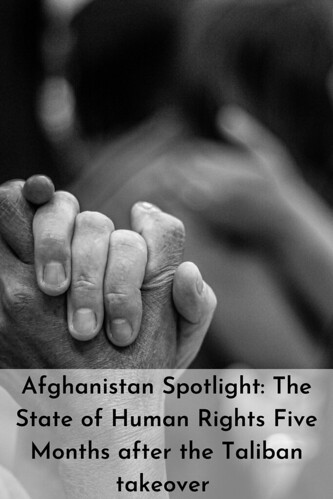
The Taliban Regime
The collapse of the Taliban regime in 2001 paved the way for a new life for women in Afghanistan. Around 5,000 women began working across three security agencies: The Ministry of Defense and the army, the Ministry of Interior and the police, and the National Directory of Security or Afghanistan’s secret police.
While women held many different positions in these agencies, when the Taliban returned, they were removed from these positions…and those who had fought against the Taliban feared for their and their families’ lives.
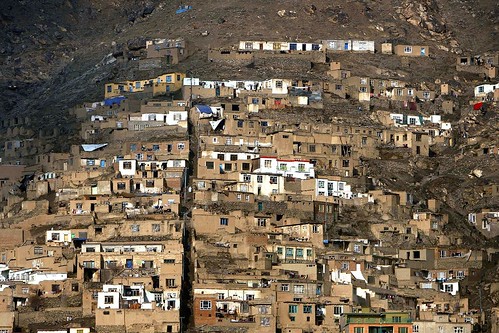
One woman who was on duty the day the Taliban took Kabul reported that every changed instantly:
“It was Sunday, I was with my colleagues in the special police forces department building. Unfortunately, I was sick that day and I went to the doctor we had in our center. All of a sudden, we were radioed to reach [headquarters]. After that, we were ordered to pack up and return to our homes. I took off my military uniform and left in informal clothes. On the way, I saw everyone on all sides in a hurry. I saw the Taliban patrolling on top of [Humvees]. The situation was very bad. My family called me multiple times telling me to be careful. All of my colleagues who were in the same car as me were terrified since everything happened very quickly and our dark days began.”
She further stated that she, and many other women who worked in these sectors, had begun to receive multiple calls from the Taliban threatening to find and harm them. These threats resulted in multiple women fleeing their homes. To date, women still continue to live in fear under the Taliban regime—but are continuing to fight back.

Women in Afghanistan continue to call on human rights organizations, the international community, and NATO to help them to safely evacuate those who are in hiding from Afghanistan as soon as possible.

Afghanistan’s Exiled Women MPs
When the Taliban took over Afghanistan in August, they forced Afghan female MPs to flee the country, as they began to fear for their lives. This action from the Taliban government was another restriction to women’s human rights in Afghanistan.
Now in December, 2021, 9 out 69 women MPs remain in hiding, but all still want to continue fighting for women's rights. Currently located in Greece, 22 of the female MPs are trying to challenge the current all-male government in Afghanistan, by asking the international community to question the Taliban’s perspective towards women’s rights. However, one of the MPs is trying to return to Kabul regardless of the danger, as she argued that little can be achieved from abroad and “we have to be inside Afghanistan.”
While in hiding, these women have continued to live in fear for both their own and their families’ lives. However,
Some Good News
On Sunday 12th December 2021, the Taliban’s education ministry granted permission for mobile libraries to restart in Kabul; this had been on hold since the takeover. The mobile library is one of five buses set up by a local organization called Charmaghz, established by Afghan Oxford University graduate Freshta Karim.
Since the takeover, girls' education has been stunted by the Taliban regime, and millions of girls across the country have been barred from secondary education in state schools. The restarting of the mobile libraries is a chance to give those who cannot attend school access to learn new things.

Charmaghz paves the way for hope in Afghanistan, and a chance for all children to have some form of education and access to learning materials.
Afghan Women’s Sports
When the Taliban first took control in August 2021, they claimed their regime would not resemble their previous rule in the 1990s.
However, their actions slowly began to suggest otherwise—refusing women access to education and work, while also putting barriers back in place stopping women from leaving their homes without a male chaperone or taking part in any sports events.
While women continue to fight for their freedom and their rights in Afghanistan, there is some light in this dark time. One of the restrictions for Afghan women was the banning of female sports. However, the female Afghan football team managed to escape to the UK this month.

Team player Fatemah Baratean stated that, “We’d been selected to play in the under-23 Central Asian FA women’s championship, in Tajikistan, then all of a sudden there were explosions and bomb blasts all around, 100 metres from us, smoke, people screaming, mothers running. We didn’t know what was going on.”
The team was told that the Taliban had taken control, and this would be their last session together for the time being. However, these women refused to accept this restriction. While the Taliban threatened them and anyone who would support them, they continued to play in private.
When trying to flee from Tajikistan, the team realized that the airports were not an option, as the Taliban were watching them and trying to stop them from leaving. This left the players and their families to hide in hostels while trying to find another way out Kabul.

They eventually managed to get visas from Pakistan, but would have to make their own way across the border. However, when they arrived at the border, the Taliban were beating men and forcing women to cover their faces—and if they refused, would beat them as well.
Fortunately, the team managed to make their way into Pakistan with their families, and were now onto the next hurdle of finding somewhere to stay with their temporary visas. Luckily, they received word that the UK had agreed to host the whole team and their families: 130 people in total.
While feelings about leaving their homes are mixed, the team stated, “That is our country, our homeland, where we had a lot of dreams and wishes. We left everything behind. But we do have this mission and promise to ourselves that we want to invest in ourselves, to study, to work, to participate actively and inspire women and girls and be an example for others. We lost everything, but we want to empower others and send a message to other women in Afghanistan.”
Though these women should not have had to flee their homes and country, it is extremely important that all the team members and their families managed to escape safely, and can now rebuild their lives until it becomes safe for them to return home again.
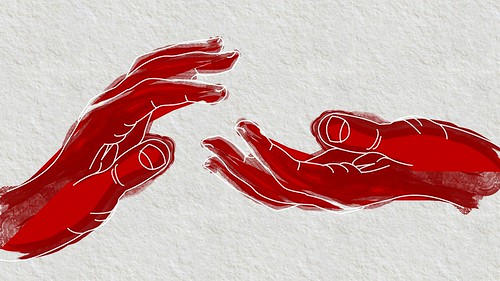
The Taliban takeover has resulted in the old regime taking form again. Women have become second class citizens in Afghanistan, and fear for not only their lives, but their basic human rights. These rights include the right to live free from violence, slavery, and discrimination; to be educated; to own property; to vote; and to earn a fair and equal wage, which were enshrined by the United Nations nearly 70 years ago.
It is essential that the international community does not turn their backs on Afghan women, and needs to challenge the Taliban government to not only give women their basic human rights, but also a place within their all male government, to ensure that their voices are heard.
However, Afghan women refuse to allow the Taliban government to suppress them. Many women continue to challenge and fight against the Taliban and refuse to be ignored, through protests and speaking out to the international community to ensure the Taliban regime is held accountable for its actions. In the hands of ordinary citizens who stand up for women and children’s rights, Afghan history will not repeat itself.
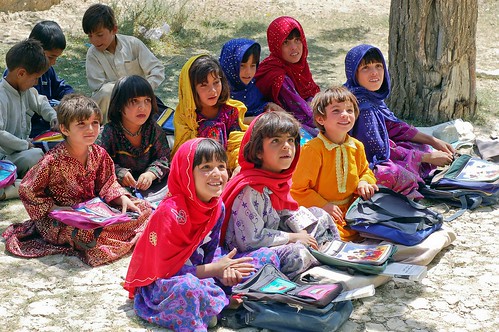
Afghanistan Spotlight articles in this series:
Women’s Human Right to Education in Afghanistan
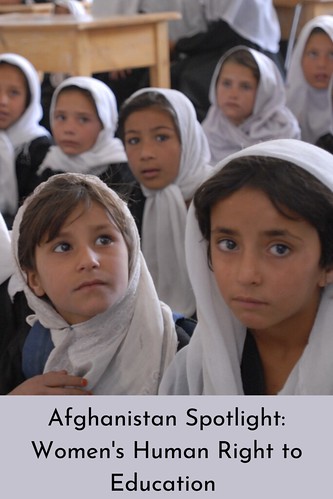
Afghanistan Spotlight: Historical Context and Transnational Feminism for Afghan Women
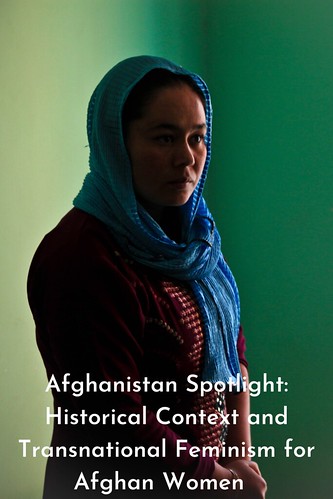
Afghanistan Spotlight: The Importance of International Cooperation for Afghan Women and Girls
Afghanistan Spotlight: The Latest Taliban Guidelines Suppressing Afghan Women

Olivia Fraser is the Women and Children’s Human Rights Editor at Wandering Educators. She is currently studying a Master’s in Human Rights and Diplomacy at the University of Stirling. She is motivated by a desire to emphasise the importance of women’s human rights.






















